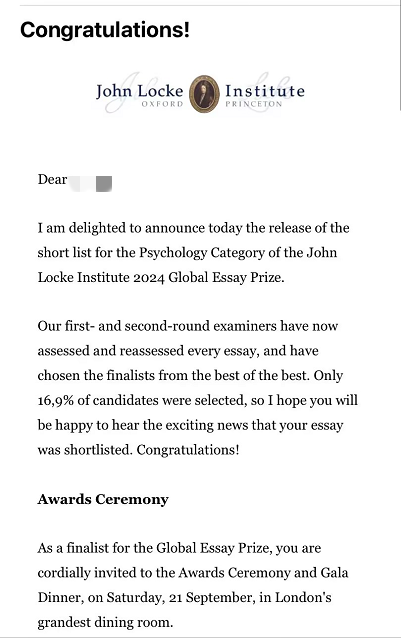写作竞赛在国际竞赛中备受瞩目,尤其在海外大学招生中扮演重要角色。高等学府注重评估学生的思想深度,因此具备独特见解和深刻探讨社会议题的学生更易获得名校青睐。2024赛季John Locke官方共收到38,000多封注册申请,比去年的19104封注册申请,暴涨100%。那么为什么John Locke论文竞赛变得如此热门?
为什么推荐参加John Locke论文竞赛?
1.申请人数暴增,竞赛大热门
近年来,John Locke论文竞赛的受欢迎程度显著提升,从2020年的2740份投稿增加到2023年的19104份,这一数字的增长表明越来越多的学生认识到该竞赛的价值所在。随着参赛人数的激增,竞赛的认可度也在不断提高,这不仅意味着更多的学生认可它的价值,也意味着获得奖项的竞争更加激烈,从而增加了奖项的含金量。
2.七大课题,覆盖多类学科
John Locke论文竞赛不同于一般的写作竞赛,它侧重于学术研究,并提供了广泛的主题选择范围。论文主题涵盖了历史、哲学、经济、政治、神学、法律、心理等七个领域,这使得不同兴趣和专业背景的学生都能找到符合自己兴趣和专长的话题。这种多元化的主题设置,不仅能够满足文科和社科学生的学术需求,还能够激发学生对这些领域的深入探索。
3.覆盖初高中阶段,低年龄也可报名
John Locke论文竞赛设有两个年龄组别:14岁-18岁的高年级组和14岁以下的低年级组。这意味着即便是年龄较小的学生也有机会参与进来。这种安排不仅为年轻的参赛者提供了展示才华的平台,还鼓励他们在学术道路上不断挑战自我,逐渐提升自己的研究能力。从小开始参与此类高水平的学术竞赛,有助于学生建立起坚实的学术基础,并为将来更高级别的学术研究打下良好开端。
其他附加价值
提升写作技能:参与John Locke论文竞赛能够极大地提升学生的写作技能,特别是在学术论文的撰写方面。这对于未来撰写大学申请论文或其他学术文章非常有帮助。
增强批判性思维:竞赛要求学生深入分析问题,并提出独到见解,这有助于培养学生的批判性思维能力和独立思考的习惯。
增加大学申请竞争力:获得John Locke论文竞赛的奖项或荣誉,可以成为大学申请中的一个重要加分项,特别是在申请人文社科类专业时。
2025赛季即将拉开序幕,想要提前备赛的同学可以领取我们的备赛资料包!
扫码免费领取John Locke 七大组别历年获奖论文合集+推荐书单









